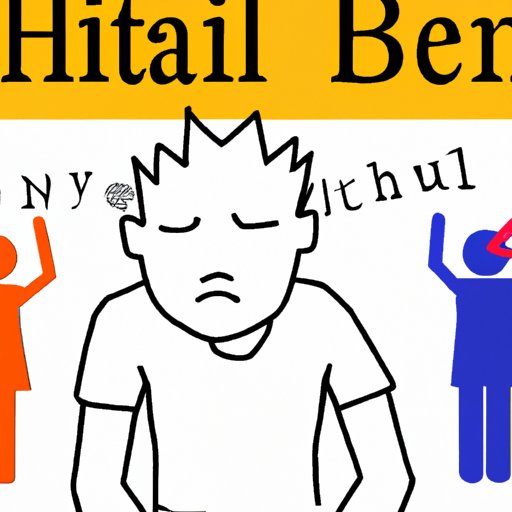Introduction
Bullying is defined as any form of intentional, aggressive behavior that involves an imbalance of power or strength. It can occur in person or online and can take many forms, including physical violence, verbal abuse, social exclusion, and cyberbullying. While it is often seen as a normal part of growing up, bullying can have serious consequences on mental health.
Examining the Long-Term Effects of Bullying on Mental Health
Bullying can have long-term psychological effects, including reduced self-esteem, feelings of isolation, and an increased risk of developing anxiety and depression. Victims may also experience physical symptoms such as headaches, insomnia, and stomach problems. In extreme cases, bullying can lead to suicidal ideation or attempts.
The psychological effects of bullying can be particularly damaging for children and teens. Studies show that victims of childhood bullying are more likely to suffer from low self-esteem and lack of confidence as adults. They may also be at higher risk for developing mental health disorders, such as depression and anxiety.
Victims of bullying may also develop Post Traumatic Stress Disorder (PTSD). This is a mental health disorder that can occur after experiencing a traumatic event, such as being bullied. Symptoms of PTSD include flashbacks, nightmares, difficulty sleeping, and avoiding situations that remind the individual of the trauma.
How Bullying Can Impact Mental Health in Childhood and Adulthood
The impact of bullying on mental health can begin during childhood and often lasts into adulthood. Children who are bullied may experience feelings of shame and guilt, which can lead to decreased self-confidence, social withdrawal, and even academic difficulties. They may also struggle with anger management and become fearful or anxious when faced with new situations.
Adults who were bullied as children may continue to experience the psychological effects of bullying in adulthood. They may feel insecure and lack self-confidence, making it difficult to form meaningful relationships. They may also be at higher risk for developing anxiety and depression, as well as PTSD.

The Psychological Impact of Bullying: Understanding the Trauma
Bullying is a form of psychological violence, and the trauma it causes can be severe. Victims may feel powerless and helpless, which can lead to feelings of worthlessness and despair. They may also struggle with guilt, shame, and a loss of trust in others.
It is important to understand the psychological impact of bullying in order to help those affected. Developing coping mechanisms, such as talking to a therapist or joining a support group, can be helpful in managing the trauma of bullying.

Talking to Kids About Bullying: Helping Them Cope with its Effects
Parents and caregivers can play a key role in helping children who are being bullied. It is important to recognize the signs of bullying and talk openly about it with your child. Encourage your child to express their feelings and provide support and reassurance. Help them build self-confidence and practice positive self-talk.
Identifying Warning Signs of Bullying-Related Mental Health Issues
It is important to be aware of the warning signs of bullying-related mental health issues. These may include changes in behavior, such as withdrawing from activities they once enjoyed or avoiding certain places or people. There may also be an increase in the use of drugs and alcohol. If you notice any of these signs, it is important to seek professional help.

Strategies for Promoting Positive Mental Health Despite Bullying
Despite the negative effects of bullying, there are strategies for promoting positive mental health. Seeking professional help is often beneficial, as a therapist can provide tools for managing stress and anxiety. It is also important to build a strong support network of family and friends, and to practice self-care by engaging in activities that bring joy.
Conclusion
Bullying can have serious consequences on mental health, from reduced self-esteem to Post Traumatic Stress Disorder (PTSD). Parents and caregivers can play an important role in helping kids cope with the psychological effects of bullying. It is important to recognize the warning signs and seek professional help if necessary. Finally, it is essential to practice self-care and build a strong support network to promote positive mental health despite bullying.
(Note: Is this article not meeting your expectations? Do you have knowledge or insights to share? Unlock new opportunities and expand your reach by joining our authors team. Click Registration to join us and share your expertise with our readers.)
